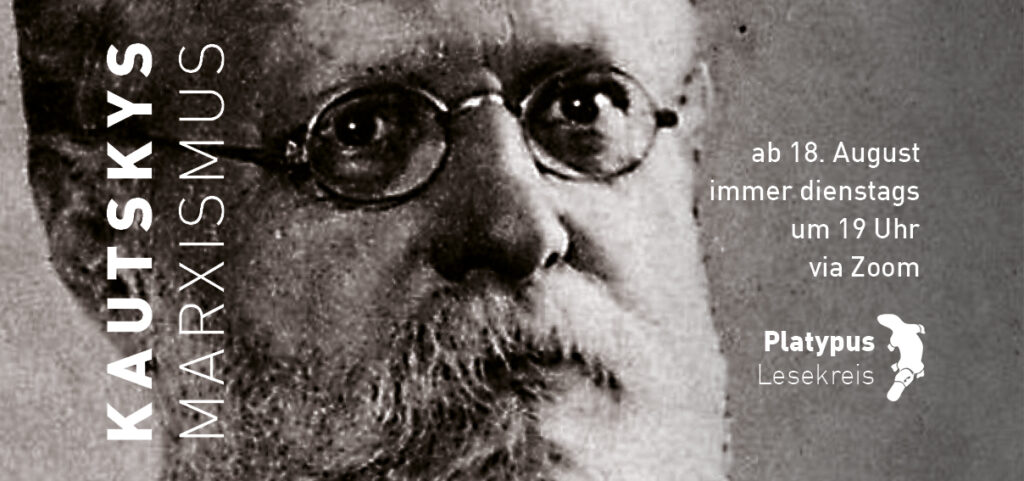
"How well Kautsky wrote [when he was still a Marxist]!" — Lenin, "Left-Wing" Communism — An Infantile Disorder (1920)
Platypus Leipzip lädt zum Ferienlesekreis über "Kautskys Marxismus".
Treff: ab 18. August immer dienstags 19 Uhr
Zoom-Link: https://us02web.zoom.us/j/89579766660
Die Texte werden zu Hause gelesen und beim Lesekreis besprochen. Kein Vorwissen ist nötig. Neue Gesichter sind immer herzlich willkommen.
● vorausgesetzte Texte / + zusätzlich empfohlene Texte
Empfohlene Hintergrundlektüre:
+ Vernon Lidtke, The Outlawed Party: SPD 1878–1890 (1966)
+ Lidtke, The Alternative Culture: Socialist Labor in Imperial Germany (1985)
+ Carl Schorske, The SPD 1905-17: The Development of the Great Schism (1955)
+ James Joll, The Second International 1889–1914 (1966)
Einleitender Text:
• Monty Johnstone, “Marx and Engels and the concept of the party” (1967)
• J. P. Nettl, “The German Social Democratic Party 1890–1914 as a Political Model” (1965)
• Spartakist-Broschüre, "Kautskyanertum und die Ursprünge der russischen Sozialdemokratie" Kapitel 1, Lenin und die Avantgarde Partei (1978)
Woche 1 | Lassalle und Marx
+ Karl Korsch, "Der Marxismus der ersten Internationale" (1924)
• Karl Marx, „Inauguraladresse der Internationalen Arbeiter-Assoziation“ (1864)
• Ferdinand Lassalle, Offenes Antwortschreiben an das Zentralkommitee zur Berufung eines Allgemeinen Deutschen Arbeiterkongresses zu Leipzig (1863)
Woche 2 | Bakunin und Marx
• Mikhail Bakunin, A Critique of the German Social-Democratic Program (1870)
• Bakunin, "Marxismus, Freiheit, Staat" (1872)
• Marx, "Kritik des Gothaer Programms" (1875)
• Marx, "Einleitung zum Programm der französischen Arbeiterpartei" (1880)
+ Marx, Konspekt von Bakunins Buch "Staatlichkeit und Anarchie" (1874)
Woche 3 | „Das Erfurter Programm“
• Karl Kautsky, "Das Erfurter Programm" (1892)
+ Eugene Debs, "Competition versus Cooperation" (1900)
+ Hellen Keller, "How I became a socialist" (1912)
+ Eugene Debs, "How I became a socialist" (1902)
Woche 4 | „Die soziale Revolution“
• Kautsky, Die soziale Revolution (1902): Teil 1 und Teil 2
Woche 5 | „Der Weg zur Macht“
• Kautsky, "Der Weg zur Macht" (1909)
Woche 6 | „Die proletarische Revolution und der Renegat Kautsky“
• Vladimir Lenin, "Die proletarische Revolution und der Renegat Kautsky" (1918)
+ Debs, “The Day of the People” (1919)
+ Kautsky, The Dictatorship of the Proletariat (1918)
Woche 7 | 3. Internationale
• Leon Trotzki: Manifest der Kommunistischen Internationale an das Proletariat der ganzen Welt
• First Four Congress of the Third International: Leitsätze über den organisatorischen Aufbau der kommunistischen Parteien, über die Methoden und den Inhalt ihrer Arbeit (1921)
• O. Piatnitsky: The 21 Conditions of Admission into the Communist International [HTML] (1934)

